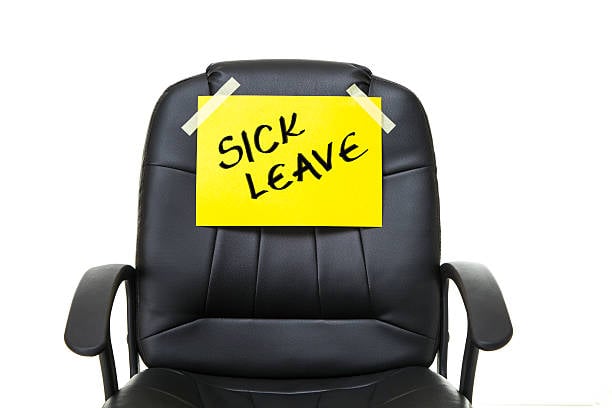Navigating sick leave policies can feel overwhelming, especially when balancing personal health with professional responsibilities. Understanding your entitlements is key to ensuring you’re supported during periods of illness. This guide will answer all your questions about sick leave and sick pay in Ireland, empowering employees to make informed decisions about their rights and obligations.
What is sick leave?
Sick leave is time off work that an employee takes due to illness or injury. In Ireland, the sick leave act governs employees’ entitlements to paid sick leave. While employers have varying policies, understanding the statutory minimum entitlements is essential for every worker.
Paid sick leave in Ireland: What are you entitled to?
The sick leave act, effective from January 2023, provides statutory sick pay for employees in Ireland, ensuring financial support during periods of illness. Here’s a closer look at the key entitlements under the act:
1. Duration of paid sick leave
Employees are entitled to an increasing number of paid sick leave days over the next few years:
- 2024: Up to five days per calendar year.
- 2025: Entitlement increases to seven days.
- 2026: Maximum entitlement reaches ten days per year.
These statutory entitlements serve as a minimum standard. However, some employers may offer additional sick leave days as part of their company policies or employee contracts.
2. Rate of pay during sick leave
Under the sick leave act, employees are entitled to:
- 70% of their normal daily wage while on sick leave.
- Payments are capped at €110 per day to ensure consistency across different industries and income levels.
This ensures that employees receive fair compensation without placing undue financial strain on employers.
3. Eligibility criteria
To qualify for statutory paid sick leave, employees must meet the following requirements:
- Continuous Service: A minimum of 13 weeks of continuous employment with their current employer.
- Medical Certification: Submission of a valid medical certificate outlining the illness or injury preventing them from working.
Employers have the right to request additional documentation if necessary, but the process should remain fair and reasonable.
4. Employer policies and additional benefits
While statutory sick leave sets the minimum standard, many companies offer enhanced policies, including extended paid sick leave or additional wellness programs. It’s important to review your employment contract or consult your HR department to understand the full range of employee benefits available to you.
For example, some organisations might provide full pay for a set period during sick leave, additional mental health support, or flexibility for managing long-term illnesses.
5. Illness benefit and extended sick leave
If your sick leave exceeds the statutory or company-provided sick leave duration, you may be eligible for illness benefit through the Department of Social Protection. This benefit provides financial assistance to individuals unable to work due to illness.
- To apply, you’ll need a medical certificate and meet PRSI contribution requirements.
- More details are available on the gov.ie website.
Understanding your entitlements under the Sick Leave Act ensures you can manage health-related absences with confidence. Whether you rely on statutory provisions or additional employee benefits from your employer, staying informed empowers you to handle illness and its impact on your professional life.
Uncertified, long-term, and Covid sick leave in Ireland
Understanding the different types of sick leave is essential for managing health-related absences effectively. Here’s a breakdown of uncertified, long-term, and Covid-19 sick leave in Ireland:
Uncertified sick leave
Uncertified sick leave refers to taking time off work without providing a medical certificate.
- Employer policies: There is no statutory requirement for uncertified sick leave in Ireland. The allowance for such days varies by employer and is often outlined in your employment contract or company handbook.
- Practical tip: Familiarise yourself with your workplace policies on uncertified sick leave to avoid complications.
Long-term sick leave
Long-term sick leave applies when an illness or injury prevents an employee from returning to work for an extended period.
Key considerations:
- Medical updates: Employers may request periodic updates or medical assessments to understand the employee’s recovery progress.
- Illness benefit: Once statutory sick pay ends, you may qualify for illness benefit through the Department of Social Protection if you meet the required PRSI contributions. Learn more on the gov.ie website.
- Fair procedures: Employers must follow fair procedures, including exploring accommodations, such as adjusted duties or flexible hours, to support the employee’s return to work where feasible.
Covid-19 sick leave
During the Covid-19 pandemic, temporary measures were introduced to support employees unable to work due to Covid-related illnesses.
- State support: Employees received additional sick leave provisions or state financial support during Covid-related absences.
- Current guidelines: While many measures have been phased out, it’s important to check for updates on any remaining entitlements or adjustments to workplace policies.
Sick leave and public holidays
If you are on sick leave during a public holiday, you may still be entitled to benefit from the public holiday. Depending on your situation, this could mean:
- An additional day off,
- A paid day,
- Or a day’s pay.
Your entitlements depend on your contract and the specific circumstances of your absence. Employers are obligated to honour public holiday entitlements for employees on certified sick leave.
Returning to work after sick leave
The transition back to work after an illness can be challenging, but clear communication and proper planning can make the process smoother.
- Medical certificate: Employers often require a certificate confirming you are fit to return to work.
- Open dialogue: Maintain open communication with your manager or HR department to discuss any accommodations or phased return-to-work plans.
For guidance on navigating life changes that impact your career, such as career breaks or financial planning, explore resources on managing a career break and addressing pension gaps.
By understanding your rights and responsibilities under Irish sick leave laws, you can approach health-related absences with confidence. Stay informed about your entitlements to uncertified, long-term, and public holiday sick leave, ensuring a smooth transition back to work when the time comes.
Common questions about sick leave in Ireland
Can my employer contact me while on sick leave?
Yes, but only for legitimate reasons, such as updating you on workplace changes or seeking information about your expected return date. Employers must ensure communication respects your privacy and health.
Can I transition from sick leave to annual leave?
Yes, unused annual leave can often be carried over if you were unable to take it due to illness. The rules surrounding this depend on your employer’s policies and Irish labour laws.
What about pregnancy-related sick leave?
Pregnancy-related illnesses are treated the same as any other illness under Irish employment law. However, extended absences may affect maternity benefit entitlements.
Know your sick leave rights with Recruit Ireland
Understanding your sick leave and sick pay entitlements is essential for managing your health and career effectively. Whether navigating uncertified leave, long-term absences, or pregnancy-related illnesses, being informed about statutory rights and employer policies ensures you’re prepared. For more guidance on workplace rights, career planning, and making informed decisions about your professional life, explore the resources available at Recruit Ireland’s Advice Centre.










